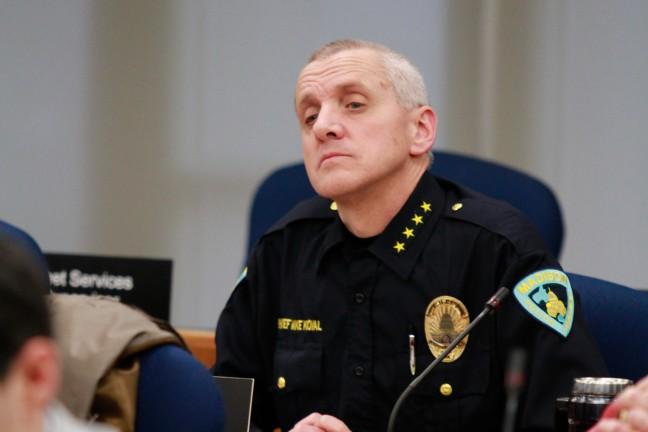Madison Police Department chief Mike Koval took a step away from his duties Wednesday to speak at Edgewood High School about his police background and issues facing the Madison community, such as human trafficking and opioid addiction.
Koval spent 29 years as a police officer with MPD before becoming police chief in 2014.
Since becoming police chief, Koval has encouraged his staff to “police like a champion” — a nod toward the University of Notre Dame’s football mantra “play like a champion.”
Koval challenges his officers to think of the best possible resolution when they respond to a call, which he urges can’t start with a ticket or an arrest. He wants his officers to think out of the box and through a lens of restorative justice.
Every January, Koval addresses his officers and urges them to create their own narrative — a narrative that’s different than what’s shown on the news of police using excessive force or misbehaving. The narrative Koval wants to create is having officers treat each call like it is the only call they will get that day.
“If we take the time and make the effort, we’re going to create a new narrative in Madison that we can be proud of,” Koval said.
There are also disparities facing Madison, Koval said. Even though Madison has less than 4 percent unemployment and the highest rate of occupancy in apartments, these numbers don’t tell the full story.
Madison has the highest rate of occupancy in apartments, but it also has the state’s highest rents, so finding affordable housing for individuals on fixed income is challenging, Koval said.
A problem that is pervasive and only growing in the Madison community is human trafficking, Koval said. Human trafficking is the second most profitable industry after drug trafficking, he added.
Compared to some other departments, like the Dallas Police Department, MPD has to do more and update their resources when it comes to dealing with this issue, he said.
In his blog, in addition to talking about cases, Koval lists missing and runaway juveniles in the area because this population is the most vulnerable to human trafficking.
“I want to try to tell Madison in ways that we are seeing this daily, if not hourly,” Koval said. “We’re only now beginning to see the width and depth of the problem.”
Another issue facing the Madison community is the opioid crisis.
So far in 2017, Koval said MPD officers have responded to 224 heroin overdoses — and the year isn’t over yet. Twenty-three of those were obvious overdose deaths.
In 2016, there were 143 overdoses — a 57 percent increase — and there were seven obvious overdose deaths.
To combat this rising issue, MPD partnered with UW Health, Dane County social services and local providers last year to begin an initiative called Madison Addiction Recovery Initiative.
When MPD officers finds someone who is overdosed and has no previous criminal history, instead of writing them a ticket and having the subject be put into the criminal justice system, the goal is treatment.
If the subject wants treatment and remains true to that treatment for at least six months, then the ticket no longer exists.
“What we’re trying to do is look at this as an addiction, a disease,” Koval said. “The jail isn’t treating it … we’re not getting at the root cause. We need to do something different.”


